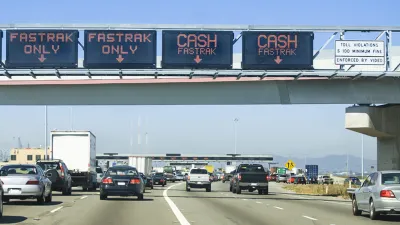The Washington Post editorializes against the use of general funds to fill the Highway Trust Fund shortfall ($18 billion annually), whether they be dedicated funds or offsets, and evaluates proposals from President Barack Obama and House Republicans.

In contrast to a recent op-ed that advocated using dedicated general funds revenue to fund transportation (posted here) and one senator's proposal to insist that use of general funds be offsetted, this editorial strongly makes the case for relying on user fees as has been the case since 1956.
"It is both efficient and fair to require drivers to pay according to the amount they exploit and degrade the roads," writes The Washington Post Editorial Board. "This discourages overuse rather than subsidizing big-time road users," they add.
The smart and obvious way to fund federal transportation policy is to create a steady, long-term funding source to finance multi-year projects, one that relies on fees from users — such as a higher gas tax or a vehicle-miles tax.
"The latest news is that House Republican leaders are drawing up a measly one-year trust fund fix [also posted here: "Buy a Stamp—Patch a Highway?"], which would conveniently push tough revenue choices past this year’s election," they write. However, Politico's Adam Snider indicates that's a no-go in the Senate - from at least one powerful Republican.
"I know they're trying to come up with a way to do this on a short-term basis. Ultimately we've got to get to a longer-term solution," Senate Commerce ranking member John Thune (R-S.D.) told MT.
The editorial is more direct, stating that House Republicans would take 10 years of savings (by ending Saturday delivery) "to pay for that one year of proposed highway spending," showing just how great a strain transportation is on the federal budget compared to other services.
President Obama's funding proposal, the Grow America Act, actually meets Sen. John Thune's criteria by providing four years of funding with a "one-time windfall from corporate tax reform," though it would not make for "smart transportation policy."
In fact, the editorial supports the funding mechanism of both proposals, i.e. ending Saturday postal service and corporate tax reform, but it opposes using them "to jury-rig the highway budget with unrelated 'offsets'". The editorial concludes with this warning:
If the nation’s leaders are too cowardly to make obvious policy choices this year, they will have to develop some backbone before the next self-imposed transportation funding crisis. At the rate we’re going, that won’t be so long from now.
FULL STORY: Congress detours from common sense on the Highway Trust Fund

Analysis: Cybertruck Fatality Rate Far Exceeds That of Ford Pinto
The Tesla Cybertruck was recalled seven times last year.

National Parks Layoffs Will Cause Communities to Lose Billions
Thousands of essential park workers were laid off this week, just before the busy spring break season.

Retro-silient?: America’s First “Eco-burb,” The Woodlands Turns 50
A master-planned community north of Houston offers lessons on green infrastructure and resilient design, but falls short of its founder’s lofty affordability and walkability goals.

Test News Post 1
This is a summary

Analysis: Cybertruck Fatality Rate Far Exceeds That of Ford Pinto
The Tesla Cybertruck was recalled seven times last year.

Test News Headline 46
Test for the image on the front page.
Urban Design for Planners 1: Software Tools
This six-course series explores essential urban design concepts using open source software and equips planners with the tools they need to participate fully in the urban design process.
Planning for Universal Design
Learn the tools for implementing Universal Design in planning regulations.
EMC Planning Group, Inc.
Planetizen
Planetizen
Mpact (formerly Rail~Volution)
Great Falls Development Authority, Inc.
HUDs Office of Policy Development and Research
NYU Wagner Graduate School of Public Service


























